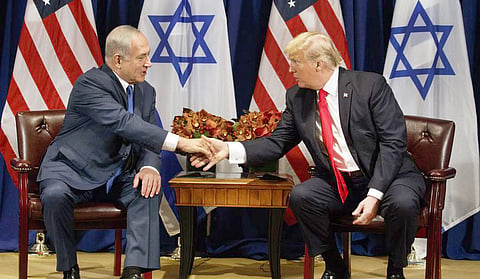How America lost its empathy
By slashing UNRWA funding, Washington has subverted its own long-cherished tradition as a donor nation — giving even to those it considered its enemies

Talk about lack of empathy by a Big Power that used to pride itself on being imbued with an abundance of compassion, generosity and magnanimity, a nation given to an outpouring of kindness when it came to those in need of a helping hand! The United States, sadly, used to be, but now is not, one such polity.
When the United States last year slashed its contribution to the United Nations Relief and Works Agency (UNRWA) from $360 million (Dh1.32 billion) to a paltry $60 million, presumably because Palestinian leaders were “no longer willing to talk peace”, it wreaked havoc on the agency. Since 1950, when it was founded, UNRWA has provided educational, health and social services to Palestinian refugees. Later, the descendants of Palestinian refugees, who were expelled from their homes and homeland in 1948, following the dismemberment of Palestine and the establishment there of the Zionist state — an event made possible by a United Nations resolution that year that the US lobbied aggressively to see passed.
As Arnold Toynbee, the legendary British historian, observed at the time: “If the UN was responsible for the catastrophe that befell Palestinian Arabs, then it is the responsibility of the UN to alleviate the suffering of these same Palestinian Arabs”. Member-states of the international body were of a mind on the issue, and UNRWA was thus created.
The agency’s budget remained Lilliputian, certainly compared to the aid given to Israel, which today receives around $3 billion from Washington each year — not including millions in tax-deductible contributions from American Jews and American Jewish institutions. But UNRWA soldiered on regardless and did a lot of fine work, providing, in addition to services, gainful employment to a lot of Palestinians as members of its working staff.
Now after the US has revealed — and revelled in — its decision to withhold funding to the agency has come as a rude shock to impoverished Palestinians, who have long depended on it for their survival.
Here’s an illustration of the consequences of that cavalier decision, one taken clearly to punish Palestinians (and what other word would do here?) for their leaders’ putative recalcitrance. In the West Bank and Gaza, UNRWA was forced a week ago to layoff more than 250 employees. Another 250, in Gaza, will be moved to part-time contracts. The agency’s budget for community health services will be reduced markedly, while an indefinite delay of the new school year for 526,000 children is expected.
In Gaza, blockaded on all sides, miserable, destitute and pauperised to the limit that any human habitat can endure, the budget cuts are “making an intolerable humanitarian crisis even more threatening”, the UNRWA spokesman, Chris Guinness, was quoted as saying in a news report in the Washington Post on July 26. “Now the very organisation mandated specifically to provide life-saving services is being forced to cut service provisions”. He added:” It’s heartbreaking”.
In the same news report, datelined Jerusalem and filed by Loveday Morris, we read this: “During emotional scenes at the agency’s compound in Gaza, one [laid-off] employee tried to set himself on fire, according to the local union. Images showed him dousing himself in gasoline before being wrestled to the ground”.
When you are laid off work, have a family to support, children to feed, and now no way of redeeming yourself as a human being, you can be driven to such lunatic extreme of despair.
By adopting such an invidious and even vindictive posture towards Palestinian refugees, the US has chosen to subvert its own long-cherished, long-held, long-known tradition as a giving nation, giving even to those it considered its enemies, when these enemies were in dire need of succour. Recall here, as a case in point, how in December 2003, after a devastating earthquake in the ancient city of Bam, in southeastern Iran, that left thousands dead and many more injured, the US was quick to send a military plane carrying 80 personnel and medical supplies to the region, followed soon afterwards by seven US Air Force cargo planes with 150,000 pounds (68,038kg) of relief supplies, including blankets, medical supplies and water, which made the US one of the biggest donors on the scene.
As to why America, or at least its officialdom, has got itself into such a sour national mood of late (you remember, no doubt, then presidential candidate Ted Cruz in 2016 bragging about how he, if elected, would “carpet-bomb” Middle Eastern countries and find out for himself if “sand can glow in the dark”), well, we will leave that to researchers in the therapeutic community and to social scientists to untangle. Perhaps they will begin by looking into how American society, conflicted as it is today, has changed in recent years, leading to a larger focus by its on populist values and less on the all-embracing notion that, as human beings, we are all brothers and sisters, all guests in each others’ homes.
This US administration has denied needy Palestinian refugees their food rations, their children an education and their bread-earners gainful employment. Hardly the nation I knew and adopted as my own close to half a century ago.
Fawaz Turki is a journalist, lecturer and author based in Washington. He is the author of The Disinherited: Journal of a Palestinian Exile.


